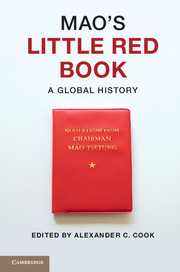Book contents
- Frontmatter
- Contents
- List of illustrations
- List of contributors
- Preface
- 1 Introduction
- 2 A single spark
- 3 Quotation songs
- 4 Mao quotations in factional battles and their afterlives
- 5 Translation and internationalism
- 6 Maoism in Tanzania
- 7 Empty symbol
- 8 The influence of Maoism in Peru
- 9 The book that bombed
- 10 Mao and the Albanians
- 11 Partisan legacies and anti-imperialist ambitions
- 12 Badge books and brand books
- 13 Principally contradiction
- 14 By the book
- 15 Conclusion
- Index
- References
10 - Mao and the Albanians
Published online by Cambridge University Press: 05 June 2014
- Frontmatter
- Contents
- List of illustrations
- List of contributors
- Preface
- 1 Introduction
- 2 A single spark
- 3 Quotation songs
- 4 Mao quotations in factional battles and their afterlives
- 5 Translation and internationalism
- 6 Maoism in Tanzania
- 7 Empty symbol
- 8 The influence of Maoism in Peru
- 9 The book that bombed
- 10 Mao and the Albanians
- 11 Partisan legacies and anti-imperialist ambitions
- 12 Badge books and brand books
- 13 Principally contradiction
- 14 By the book
- 15 Conclusion
- Index
- References
Summary
A bosom friend afar brings a distant land near.
Greeting in the Albanian editionThe meeting with Mao was arranged in secret, late in the summer of 1967. The two guests, who had come all the way from Albania, explained their mission to the Chairman: editing his Little Red Book of quotations, which the Chinese had recently translated into the Albanian language. With the Cultural Revolution underway, Mao had left Beijing for Shanghai in great secrecy. No one was supposed to know his exact location, including high-ranking Chinese Communist Party (CCP) Central Committee members. The Chairman agreed to the meeting anyway – evidence, Kang Sheng explained to the visitors, that Mao cared deeply about the tiny Balkan ally. But what Mao had to say on account of the Little Red Book came as a shocking surprise to the guests. His quotations were “worthless,” he told them, and they could not possibly be of any value to the Albanians. The book was “nothing more than a collection of materials with historical insights into China.” Mao went on to explain that he had given instructions to publish Marx’s quotations, as well as Engels’, Lenin’s, and Stalin’s. But his inferiors had neglected the classics. “Now we ought to do this,” the Chairman added. “Marx, Engels, Lenin, and Stalin have authored a lot of works and, in order to popularize them, we must publish their quotations.” Utterly baffled, the Albanians rushed to affirm that Mao’s quotations were of utmost political importance for their country. Comrade Enver Hoxha, head of the Party of Labor of Albania (PPSH), had entrusted them personally with this important task. “See if you find them useful,” Mao responded. “China’s experience may serve other countries, but they must judge this for themselves.”
- Type
- Chapter
- Information
- Mao's Little Red BookA Global History, pp. 165 - 184Publisher: Cambridge University PressPrint publication year: 2014
References
- 2
- Cited by



